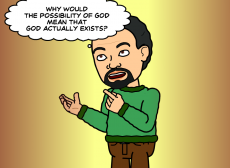
This article may best be viewed by 12+ as it can be quite a complicated subject, but judge for yourself. There are many arguments that try to prove the existence of a God or deity, and perhaps the most simple is the ontological argument. It is good that it is simple as it makes it easier to understand. People have many different opinions on religion so it would be unhelpful to argue narrow mindedly but rather create an argument that everyone can consider, whether atheist, agnostic or religious. However its simplicity means that it is also easily criticised. Let's consider the argument and then also the main criticisms of it. I must stress here that it doesn't matter whether you do or don't believe in the existence of a God or even aren't sure, we are simply practising learning how to criticise and debate and this will help you in the future in your studies in order to negate counter arguments, particularly at degree level.
The Ontological Argument is an ‘A priori’ argument with Analytic Premises that reach a Deductive conclusion. The main proponent of the argument is St.Anselm (1033-1109) who wrote the Ontological Argument in his ‘Proslogian’. This argument for the existence of God is formed on the basis that “Aliquid quo nihil maius cogitari posit” which translated from Latin to English means that “God is a being than which nothing greater can be conceived.” Anselm explained this argument in two forms and his thesis, ‘On behalf of the fool’, follows the words of ‘Psalm 14 Verse 1’ – “The fool says in his heart there is no God”. There are many criticisms of this argument, from such philosophers as Gaunilo of Marmoutiers in the 11th Century and much later Immanuel Kant in the 18th Century.
In Anselm’s first form he explains that God is the greatest possible being than which nothing greater can be conceived. If God exists in the mind alone (only as an idea- ‘in intellectu’) then a greater being could be conceived to exist both in the mind and in reality. This second being would be greater than God but God is the greatest possible being and so must exist not only in the mind but also in reality. Gaunilo challenged this, satirically entitling his response “On behalf of the fool”, a reduction ad absurdum argument which, translated to English, literally means ‘reduction to the absurd’, or is perhaps more easily understood as ‘proof by contradiction’. He challenged Anselm’s first form, stating that it can be applied to anything and used the analogy of a perfect island that may be imagined in the mind and is thus even greater in existence so as to be the greatest possible island. Gaunilo’s response to Anselm’s first form mocked his Ontological Argument for the existence of God and provoked a response from Anselm; thus he created his second form.
Anselm stated that you cannot try to apply the argument to things that we know have contingent existence such as an island. He reiterated that God is the greatest possible being than which nothing greater can be conceived and stated that it is greater to be a necessary being that cannot not be than a contingent being which can cease to exist. As God is the greatest possible being he must therefore be non contingent and exist. The Ontological Argument then lay neglected for over five centuries before it was revived by Rene Descartes (1596-1650) in the 17th Century in the fifth of his ‘Meditations’. He developed the argument and stated that as God is a supreme being he must exist because any being that ever failed to exist or could fail to exist would not be perfect. Existence is a necessary attribute of the perfect being just as a triangle’s angles have to add up to 180 degrees to be a triangle (this analogy became known as Descartes’ Triangle).
Immanuel Kant then responded to Descartes’ adaptation of the Ontological Argument, heavily criticising it, in particular the word ‘exists’. Kant argued that if existence is perfection then it is saying a property or characteristic i.e. its presence or absence determines whether some things are perfect or not. Descartes and Anselm are using existence as a predicate of God, thus Kant arrived at his conclusion. Kant identified how deceptive the word exists can be. Whilst grammatically a predicate, it is not a real predicate because its logical function is entirely different. Its role is not to ascribe a quality but to assert the thing exists which you have to go and look for to prove, ‘a posteriori’. Therefore, Kant concludes that the Ontological Argument is based on ‘bad grammar’. He also, as in earlier criticisms, did not believe in a necessary being which Anselm and Descartes described the non-contingent God to be.
Ultimately you can decide for yourself whether or not you think this proves the existence of a God or whether it has been disproved by criticism; someone with faith is unlikely to require proof of a God anyway. From a neutral viewpoint it is interesting to see how philosophers go about trying to prove and disprove that which ultimately cannot be proven. That is why Philosophy is so fascinating, because it considers things that we can never truly know the answer to.
IMAGE: https://vexingquestions.files.wordpress.com/2013/10/ontological-argument.png

0 Comment:
Be the first one to comment on this article.